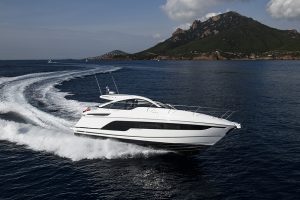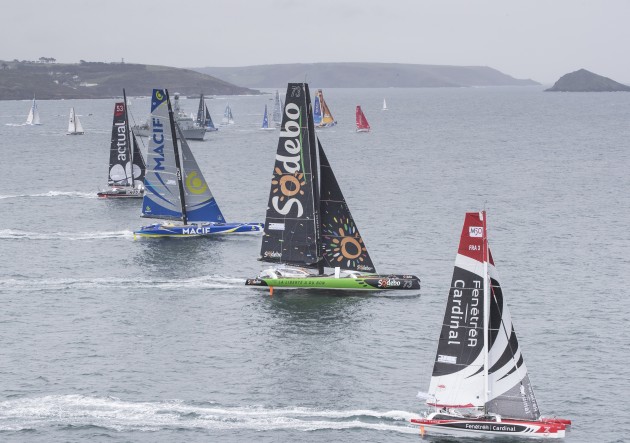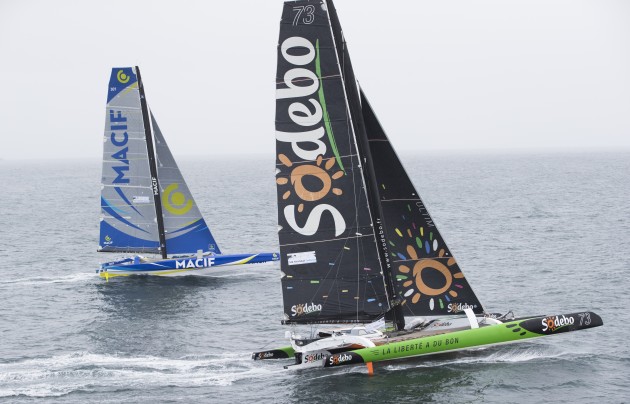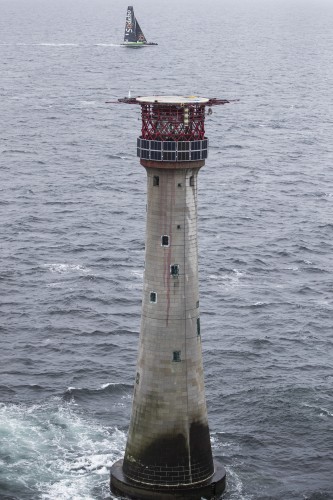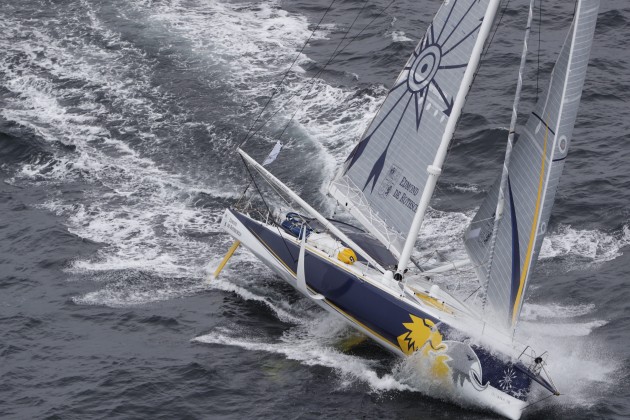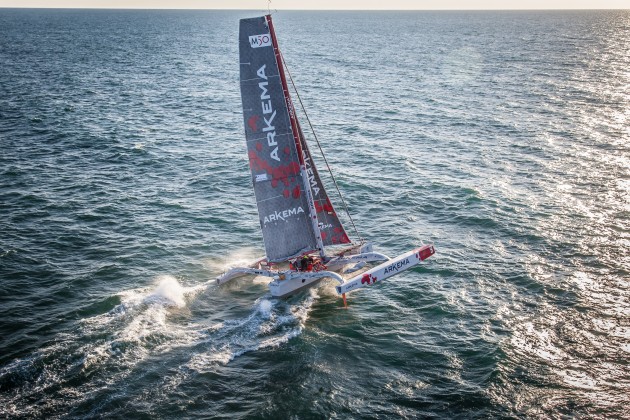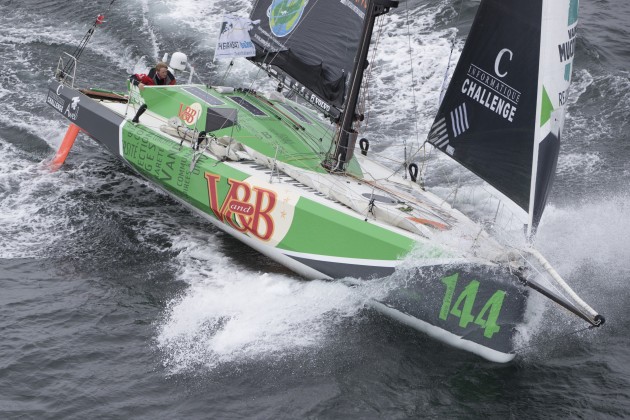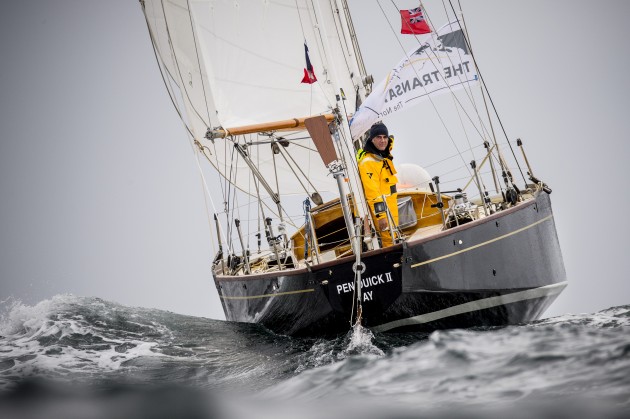Pictures: Transat bakerly skipper Tolkien rescued in mid Atlantic
British sailor Richard Tolkien is heading to America on board a cargo ship after being forced to abandon his IMOCA 60 in the mid Atlantic. Watch the video here.
16 May
The skipper of the IMOCA 60, 44, Richard Tolkien is currently on board the cargo ship, Anton Topic, after making the difficult decision to abandon his yacht – and his place in the Transat bakerly – in the mid Atlantic.
Tolkien, aged 61, contacted Race Control to ask for assistance on 13 May. He reported that he had been struggling with some major technical issues on his boat, including damage to the inner forestay. While he was on the foredeck trying to clear the sail, which was entangled in the rig, Tolkien was hit by one of the sails, sustaining an injury to his head.
After assessment by satellite phone with his shore crew, and with the race director and race doctor, and on liaising with the Maritime Rescue Coordination Centre, a VHF call was made to the cargo ship Anton Topic. The vessel was close to Tolkien’s position, approximately 880nm west, southwest of Horta in the Azores.
The decision was taken to abandon ship, on account of Tolkien’s injury and the fading daylight. Tolkien was safely transferred to the cargo vessel, which is due to arrive in Philadelphia, USA on 18 May.
“I had had a sustained period of bad weather…and the wind had started to go down from 40 knots to 30,” explained Tolkien, who is from Lymington in Hampshire.
“I thought there was no trouble ahead and I was down below, looking forward to calmer conditions, when there was a large bang. The fitting holding the staysail stay to the deck had ruptured,” explained the skipper.
“By the time I got on deck the sail was flailing around. I turned the boat downwind and spent the next two hours trying to sort out the mess – it is very difficult on a boat of that size.”
Tolkein continued: “I was hit in the face and then later again by a glancing blow to the side of the face by the furling drum at the bottom of the stay. On the second occasion there was a lot of blood on the deck and I went down into the cabin and realised I needed to call for assistance.”
He said he used AIS to contact the nearest ship, the Anton Topic, which came alongside.
“It was not easy at all and then I had to climb up the pilot ladder at the side of the ship and I only just made it, so it was very difficult. I had to leave the boat which has a tracker on it – not an easy situation – and I hope to rescue the boat. It was just a glancing blow – but if it had been a bit more full-on, then the outcome could have been very different,” Tolkien concluded.
When he got on board the Anton Topic he was treated by the ship’s medic who applied four stitches to his head wound. After a few hours sleep on board, Tolkien said he was happy that all his faculties were intact. “Apart from being tired and bit shocked, I’m OK,” he said.

Celebrations for Armel Le Cleac’h. Credit Lloyd Images.

It was an unexpected win for Gilles Lamiré on board French Tech Rennes St Malo. Credit Lloyd Images.
The 45-year-old completed the 3,050nm course from Plymouth to New York in an official time – that included a 31-minute penalty for accidental breakage of his engine seal – of 12 days, seven hours and 51 minutes.
This downwind delivery back to Quiberon, where Pen Duick II has been owned and used as part of the sailing school for nearly 50 years, should take the skipper around 10 days to complete.
11 May
François Gabart completed his first solo win on board his 100ft trimaran, Macif on 10 May when he crossed the finish line of The Transat bakerly off New York.

François Gabart celebrates after taking line honours in The Transat bakerly. Credit Lloyd Images
The 33-year-old Frenchman, who in 2013 became the youngest ever winner of the Vendée Globe solo round-the-world race, sailed the official distance of 3,050nm in 8 days, 8 hours, 54 minutes and 39 seconds.
He narrowly missed out on a new race record, which was set by his friend and mentor Michel Desjoyeaux in 2004. The record still stands at a time of 8 days, 8 hours, 29 minutes.
Gabart’s blue, white and yellow Van Peteghem Lauriot-Prevost-designed multihull, in which the skipper hopes to set a new outright solo round-the-world record, reached the finishing line at 18:24 local time in New York. It was recorded by the Sandy Hook Pilot Association boat.
Unusually for The Transat bakerly, Gabart, along with his closest rival Thomas Coville, took a course hundreds of miles south of the Azores into the trade winds, before heading north west up to New York.

Gabart on board MACIF crosses the finish line. Credit Lloyd Images.
Reflecting on the race, Gabart noted that for most of the time, he was in close company with the 48-year-old Coville on Sodebo. For the first three days, the two skippers were never more than a few nautical miles apart, having crossed the Bay of Biscay in sight of each other.
“The competition with Thomas on Sodebo was wonderful. It made the race incredible for me. We are working together to organise more races for these type of boats, and when we see what happened in The Transat bakerly, and how close the competition was, we know there is a place for it. This is just the beginning of the journey,” said the winner of the Ultime class.
Gabart said he relished the experience. “It was a big challenge for me. You should have 10 or 15 people to manage these boats, and it’s just me. It was my first solo race on Macif, and I didn’t know if I was able to do it, so I am really proud of what I did,” he said.
“To arrive into New York was perfect. The boat is in good shape. Me? Well, maybe not! I’m very tired, but I’m incredibly proud,” concluded Gabart.
The skipper follows in the footsteps of British legend, Sir Francis Chichester, who won the first edition of the OSTAR in 1960. Sir Francis sailed his monohull, Gipsy Moth III from Plymouth to New York in 40 days, 12 hours 30 minutes.
As Gabart crossed the line, Thomas Coville was still some 118nm from the finish. The third-placed trimaran in the Ultime class – Actual skippered by Yves Le Blevec – was 509.6nm from New York.
For the other classes in the fleet, the finish line is still over 800nm away.
Armel Le Cléac’h on Banque Populaire continues to lead the IMOCA 60 fleet with an anticipated arrival time of 19:00 local time on Friday. 44-year-old Vincent Riou, on PRB is 58nm behind and still hot on his stern.

Vincent Riou on PRB is chasing the leader of the IMOCA 60 fleet, Armel Le Cléac’h. Credit Lloyd Images
In the four-boat Multi50 class, Gilles Lamiré on Frenchtech Rennes St Malo is continuing to extend his lead, with a 213nm advantage between him and the chasing Lalou Roucayrol on Arkema.
Trading places at the top of the Class40 fleet is Isabelle Joschke on Generali–Horizon Mixité and Thibaut Vauchel-Camus on board Solidaires en Peloton–Arsep.

Isabelle Joschke, one of two women in the race, is leading the Class40 fleet. Credit Lloyd Images.
Joschke, 39, is currently holding a 6nm advantage.
On 10 May, Armel Tripon on Black Pepper announced his retirement from The Transat bakerly, after he sustained damage in the week’s earlier storms.
This now leaves eight Class40s in the race.
10 May
Organisers of the Transat bakerly say François Gabart is just over 200nm from the finish line, but his progress is being hampered by light winds crossing the Gulf Stream.
Speaking via satellite phone this morning, Gabart confirmed that the home straight will not be easy.
“I’ve spent the last few hours with not very much wind. I’m still a little way off the finish line. The arrival in New York will be difficult, and that is the least I can say,” he said.
Gabart’s blue, white and yellow trimaran, Macif is on course to cross the finish line at around 21:00 BST (16:00 EDT) this evening.
Gabart’s closest rival is Thomas Coville on Sodebo, who is 64nm behind Macif.
Behind the Ultimes, Gilles Lamiré, on French Tech Rennes St Malo, still leads the Multi50 fleet.
He is 227nm ahead of Lalou Roucayrol aboard Arkema. The Multi50s are also feeling the effect of the lighter conditions, currently sailing at around 6 knots.
“This is a great race, I am really enjoying it,” said Lamiré, who is delighted that his choice of a more southerly route than Roucayrol is paying off.
“I am trying to concentrate on what I am doing and I apply myself, because it’s hard. I tell myself that if I do everything right, it will continue. I am very happy with my trajectory. The choice of this southern route has been carefully thought out, it was not obvious at first. But I thought the best route in the north would not avoid the (Ice Exclusion Zone) and the routing looked a little optimistic to me. But it’s true that I did not expect to be enjoying my deckchair in the sun, downwind and south of Azores – it’s amazing!” stated Lamiré.
At the head of the IMOCA 60 class, the top three boats, Banque Populaire, PRB and St Michel-Virbac remain as tight as ever as they race past the western edge of the Ice Exclusion Zone, about 450nm southeast of Prince Edward Island in Nova Scotia.

Banque Populaire currently leads the IMOCA 60 class. Credit Yvan Zedda.
With 934nm to the finish, Armel Le Cléac’h on Banque Populaire still leads Riou by 32nm.
In the Class40 race, the fleet is split between seven skippers following in the wake of the IMOCA 60s heading towards the Ice Exclusion zone, and Louis Duc on Carac, going it alone behind Arkema, 445nm south of them.
Duc’s decision seems to be paying off for the moment, sailing at nine knots, compared to an average five knots by the northernmost boats who are running out of sea room up against the restricted zone. Currently Carac lies fifth overall, 75nm behind the leaders.
But the battle in the north continues to rage with Isabelle Joschke on Generali-Horizon Mixité now ahead of Thibaut Vauchel-Camus’ Solidaires en Peloton-Arsep by just 3nm. Joschke is one of only two women in The Transat bakerly this year. British skipper Phil Sharp on Imerys is still third, 28nm behind Joschke.
Meanwhile, alone and by some way the most easterly and most northerly boat, Loick Peyron is ploughing on on board Eric Tabarly’s Pen Duick II. He is sailing the old ketch alongside the race in tribute to the great master of French offshore sailing.

Loick Peyron aboard Eric Tabarly’s classic yacht ‘Pen Duick II’
Image licensed to Lloyd Images
Peyron has been comparing his relative performance in the same boat, and in the same trim, to that of Tabarly when he sailed to victory in the OSTAR in 1964. Peyron is currently about 175nm ahead of Tabarly’s equivalent position and 270nm southeast of him,
At a position about 800nm west, northwest of Cape Finisterre, he still has 2,053nm to sail on a direct route to New York.
“There’s either a little or a lot and we had a storm for two days,” reported Peyron. “There is a lot of wind and it’s pretty wet. My proud ship is made of wood and wood works, but it leaks a bit everywhere.”
“I hope that the coming days will be a little better, but otherwise it’s really good, the pace is quiet. I have no news from the outside world. Of course I’m a bit alone, but that was the idea of this voyage – it’s good and I have started my fourth book,” said Peyron.
He continued: “Gales have been quite difficult to handle, but all is well. It’s true that I’m a little bit ahead of my wonderful predecessor. Initially I did not want to compare my journey to his, but it was inevitable once the game began. Every lunchtime, I look at his position in his log book.”
The 56-year-old Frenchman said he is enjoying the experience of sailing Pen Duick II.
“On board it’s more comfortable than on one of the boats speeding to New York, even if it’s not at all in terms of the ergonomics. It leaks everywhere and there is water in every corner. The boat is wet, but the spray comes over the top a lot slower! It’s quite tolerable and there is a lot less stress onboard,” he stated.
“I’m learning the limits of the boat. She has not sailed in conditions as violent as these, and she’s creaking all the time – but stands firm! It really is a pleasure to be here.” concluded Peyron.
9 May
Race organisers say Macif skipper François Gabart is now just 450nm away from the finish line and looks set to break The Transat bakerly race record on 10 May.

François Gabart on Macif. Credit Lloyd Images
Currently into his seventh day of racing, Gabart is 126nm away from his closest rival Thomas Coville aboard Sodebo, and 473nm ahead of the third Ultime, Actual, skippered by Yves Le Blevec.
The current Transat race record is held by Gabart’s mentor and friend, Michel Desjoyeaux. He sailed his ORMA trimaran, Géant from Plymouth to Boston in eight days, eight hours and 29 minutes in 2004.
Although sailing towards a different finish line, this year’s edition of The Transat bakerly to New York is in fact longer than the record-setting course to Boston. If 33-year-old Gabart can finish before 1730 local time tomorrow, the record is his.
Speaking briefly to race organisers via sat phone, Gabart was keen not to tempt fate, well aware that a small mistake or a breakage could yet be his undoing. He was also not underestimating Coville, whose 48th birthday is tomorrow, saying he expects a furious fight to the finish.
The rest of the competitors are more than 1,000nm away from New York.
Among the other classes Armel Le Cléac’h on Banque Populaire continues to lead the IMOCA 60 fleet by 37nm, with 44-year-oild Vincent Riou on PRB just behind.
Le Cléac’h is making the most of the calmer conditions, after a rough and uncomfortable weekend.
“I’m taking advantage of not having the boat so heeled over. I can stand up normally to eat and I’ve been able to dry out a little,” he reported.
“It’s been damp on board since the start and we’ve not had much time to rest and regroup. The race is still very much in full force and I’m always watching my friends behind. Vincent (Riou) is always close and, in the lighter wind conditions, I do not feel comfortable. Adding to that pressure is Jean–Pierre (Dick on St Michel-Virbac in third place). The race to the finish is set,” noted Le Cléac’h, who celebrates his 39th birthday on 11 May.
In the four-boat Multi50 class, Gilles Lamiré on Frenchtech Rennes St Malo still leads the fight with an advantage of 193nm between him and Arkema’s skipper, Lalou Roucayrol.
The nine-boat Class40 fleet is being led by Thibaut Vauchel-Camus on board Solidaires en Peloton–Arsep. Just 4nm behind is 39-year-old Isabelle Joschke skippering Generali–Horizon Mixité.
After carrying out a six-hour stop-go time penalty yesterday for sailing through a restricted area, British skipper Phil Sharp is now back in the race on Imerys.
He is holding onto third place and is only 23nm behind the leader.

Phil Sharp is now back in the race on Imerys after completing his penalty. Credit PS Racing Ltd
With at least eight days of racing still ahead of him, Sharp has by no means given up hope of regaining the top spot in the class.
“I’m determined to make up the miles and I’ll be seeking every advantage possible,” he said. “There are several compression zones in the weather between now and the finish, so I hope I can take advantage of these, and try and get back in front before New York. It’s a hell of a long race – we still have another 2,000 miles to go – so anything can happen!” said Sharp, who will turn 35 on 11 May.
4 May
French skippers Sébastien Josse and Erwan Le Roux are now both out of the Transat bakerly after their boats sustained damage just days after leaving the start line.
This comes as Maxime Sorel on Vandb was forced to retire on 3 May after he collided with a container ship in the northern Bay of Biscay. This resulted in damage to his bowsprit. The Class40 skipper is now heading to the French port La Trinite sur Mer in Brittany.
Shortly after midnight, on 4 May, Edmond de Rothschild skipper Sébastien Josse, was among the leaders in the six-strong IMOCA fleet.
But, as the boats raced around the north-west tip of Spain off Cape Finisterre, the Frenchman reported damage to his mainsail.

Edmond de Rothschild, skippered by Sébastien Josse, is now out of the race. Credit Lloyd Images
In 25-30 knots of breeze, the foiling IMOCA broached during a gybe, resulting in irreparable damage to the sails batten.
Josse is now sailing the 80 nautical miles to the Spanish port of Vigo in Galicia, where he will be joined by members of the Gitana Team.
At the time of the incident, Josse was battling it out at the front of the IMOCA fleet, with just 3 nautical miles between him and the leader Vincent Riou on board PRB. Armel le Cleac’h on Banque Populaire has now moved up into second place.
Speaking after the damage, Josse said: “Everything happened very quickly, in maybe 10 seconds. I broke the batons in the mainsail, which hold the top of the sail, in a violent gybe. Despite all precautions, it is unfortunate but these things can happen,”
He continued|: “The damage is not spectacular but it is impossible to imagine I could continue the race. It is really disappointing – I was in the game, in contact with Armel and Vincent. The boat was very well prepared. That’s all the more frustrating as I think the hardest part of this first race was behind us.”
Just five hours earlier, at 19.00hrs BST and 60 miles off Cape Finisterre, Erwan Le Roux, the skipper of Multi 50 FenêtréA Cardinal, sustained substantial damage to the port float on his Multi50 trimaran.
Erwan was leading The Transat bakerly Multi50 fleet when the incident occurred, sailing downwind in a northeasterly 25-27 knots. He managed to secure his boat before alerting his shore crew.
“I had two reefs in the mainsail at the time and at first it was a big shock. I did not see what happened because I was under the cockpit cover,” explained Le Roux. “I had to intervene immediately to avoid a capsize. I went to roll the gennaker and that’s when I realised that about half of the float was missing.”
“It is super, super hard for me and also frustrating,” added the triple winner of the Transat Jacques Vabre, who is currently heading upwind on port tack, and is expected to reach port near La Coruña within 24 hours.

Skipper Erwan Le Roux sent this picture before sustaining damage to his port float.
Elsewhere in the Multi50 fleet, Pierre Antoine aboard Olmix is the only skipper to choose the northerly route. This is giving him the class lead at this stage.
The rest are favouring a southern course in the early stages before they begin heading west. Lalou Roucayrol on board Arkema leads that group, 3nm ahead of Gilles Lamire on French Tech Rennes St Malo.
Forty hours into the race the three-strong Ultime class are powering their way southwards past Lisbon, Portugal, with the overall lead being disputed by Thomas Coville on Sodebo and Francois Gabart on Macif.
“It is going well – and very quick. There is around 30 knots of wind and big seas which is causing the boat to fly off the waves,” explained Gabart. “Overnight it has been really dark – there were only three stars in the sky. We monitor the tracking to see where Thomas is. There are not many miles in it and when we go at 30 knots, it means 40 minutes is nothing.”
Further north and making their way through the Bay of Biscay, there are some classic battles within the the 9-strong Class40 fleet, with the overall lead being disputed by Britain’s Phil Sharp on Imerys – who may face a penalty after apparently sailing through a restricted area – and France’s Thibaut Vauchel-Camus on Solidaires en Peloton-Arsep. There is currently less than a mile between the two.
3 May
After their first night at sea, the 25 boats in The Transat bakerly are spread out over 100 miles of ocean.
The three-strong Ultime class are leading the race and are now well into the Bay of Biscay. The skippers will be looking to benefit from downwind conditions that could propel them west towards New York.
See pictures of the start of the 2016 Transat bakerly below
The overall lead is being disputed by French sailors Thomas Coville on Sodebo and Francois Gabart on Macif, who are just miles apart and reaching speeds of over 20 knots.
Nearly all of the skippers in each of the four classes – Ultimes, IMOCA 60s, Multi50s and Class40s – are favouring a southern route in the early stages. This will take them towards Cape Finisterre, Spain, and then further south before they begin heading west.
Speaking on the satellite phone from on board Sodebo, Coville was in good spirits and said he had no doubt that south was the best option in a race more usually associated with the shorter, but more brutal, northern route.
“In fact, in recent days, we see that the southern route is somewhat less exposed than the northern route,” said the Sodebo skipper. “With the north affected by the ice gate (an exclusion zone imposed by the race director to ensure competitors avoid icebergs) which will force people to turn south, this southern route has advantages.”
Looking back on the start on 2 May in Plymouth Sound, Coville said it had been a tricky getaway close to the breakwater and during the passage of a weather front.
“We had to make the right sail choice before leaving and there was lots to think about – I did not want to take too much risk; I wanted to do it properly,” he said.
“Francois (Gabart) was a little early on the start line and had to bear away and then we were next to each other just like a classic race – it was magical. He gradually pulled away but it was nothing dramatic,” added Coville.
The two giant trimarans raced on in sight of each other into Monday evening until they lost touch passing the island of Ushant off the French coast.
Behind the Ultimes, the leaders in the IMOCA 60 class are tightly-bunched in the north Biscay sailing downwind and making around 12 knots.
The leading boats are both fitted with foils – Armel le Cleac’h’s Banque Populaire and Seb Josse’s Edmond de Rothschild – and are only six miles apart. The first of the non-foilers in the leading bunch is Vincent Riou’s PRB which is 15 miles behind Josse.
In the five-strong Multi50 class, Pierre Antoine on board Olmix has decided to go it alone on a westerly heading, giving him the class lead at this stage, while his rivals head south.
In that group, Lalou Roucayrol on board Arkema is ahead, just over 10 miles to the good of Erwan Le Roux on Fenetrea-Cardinal.
Further north and still just south of Ushant, the 10-strong Class40 fleet are enjoying close racing.
The lead was being disputed by Britain’s Phil Sharp on Imerys and his French rival Maxime Sorel on Vandb.
However, at 09h59 BST today (3 May), Sorel had a serious collision with a cargo ship. The bowsprit was damaged and there are also concerns about the rig, which was still standing up.
His present position is about 90 nautical miles from Penmarc’h. Sorel is not injured and is now heading to La Trinité sur Mer, or Lorient, to assess the damage.
Meanwhile, British skipper Phil Sharp appears to have sailed through a traffic separation scheme. Race Direction is aware of the course error and the Race Committee Jury has been notified.
Alongside the Transat bakerly fleet is a one-off entry by the Frenchman Loick Peyron.
He is sailing Eric Tabarly’s 44ft wooden ketch Pen Duick II in the same trim as the vessel was when Tabarly raced the ketch to victory in the OSTAR in 1964.
Peyron, who is expecting to take around 27 days to reach the finish at New York, is currently due south of the Isles of Scilly, making just over five knots.
Plymouth prepares for The Transat bakerly’s return
Skippers taking part in The Transat bakerly will arrive in Plymouth on 24 April before the race begins early next
Ellen MacArthur Cancer Trust named official charity of The Transat bakerly
With just a month to go until the start of The Transat bakerly, OC Sport has announced The Ellen MacArthur…




